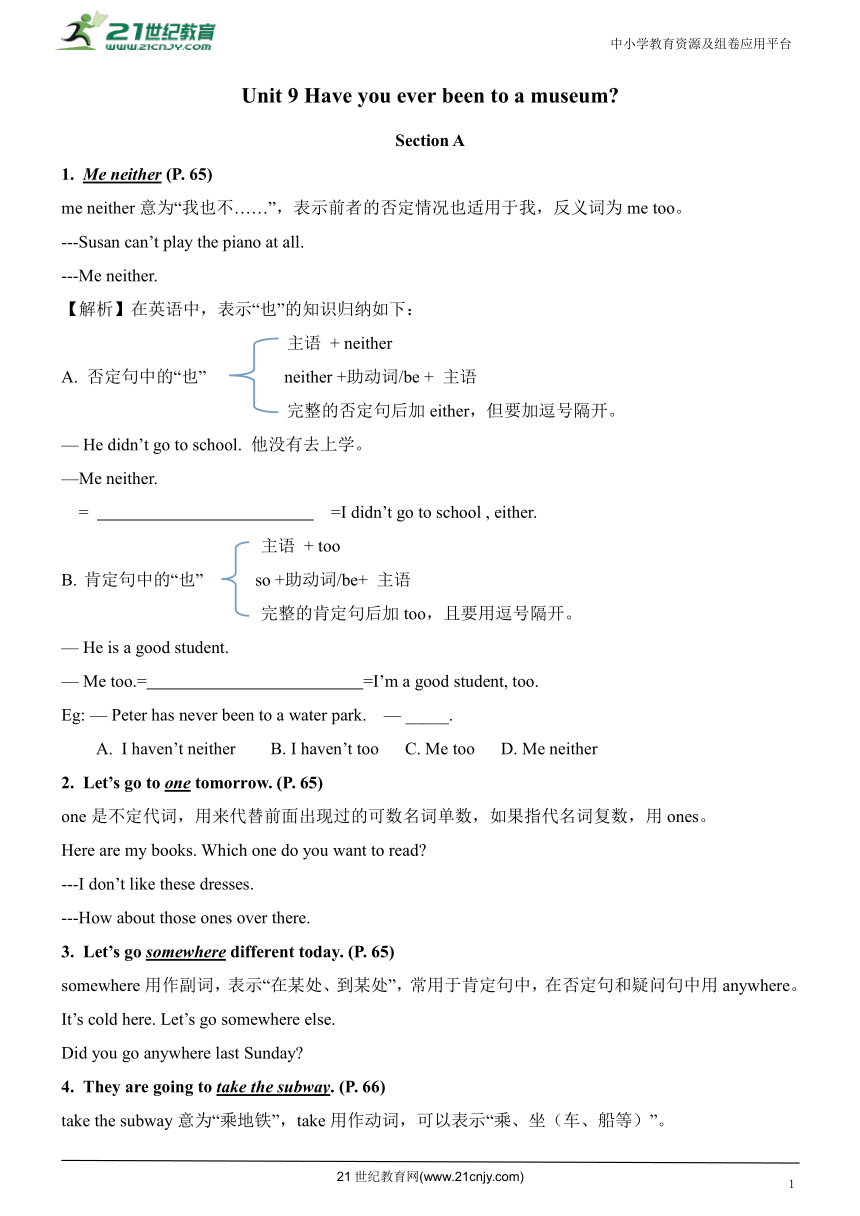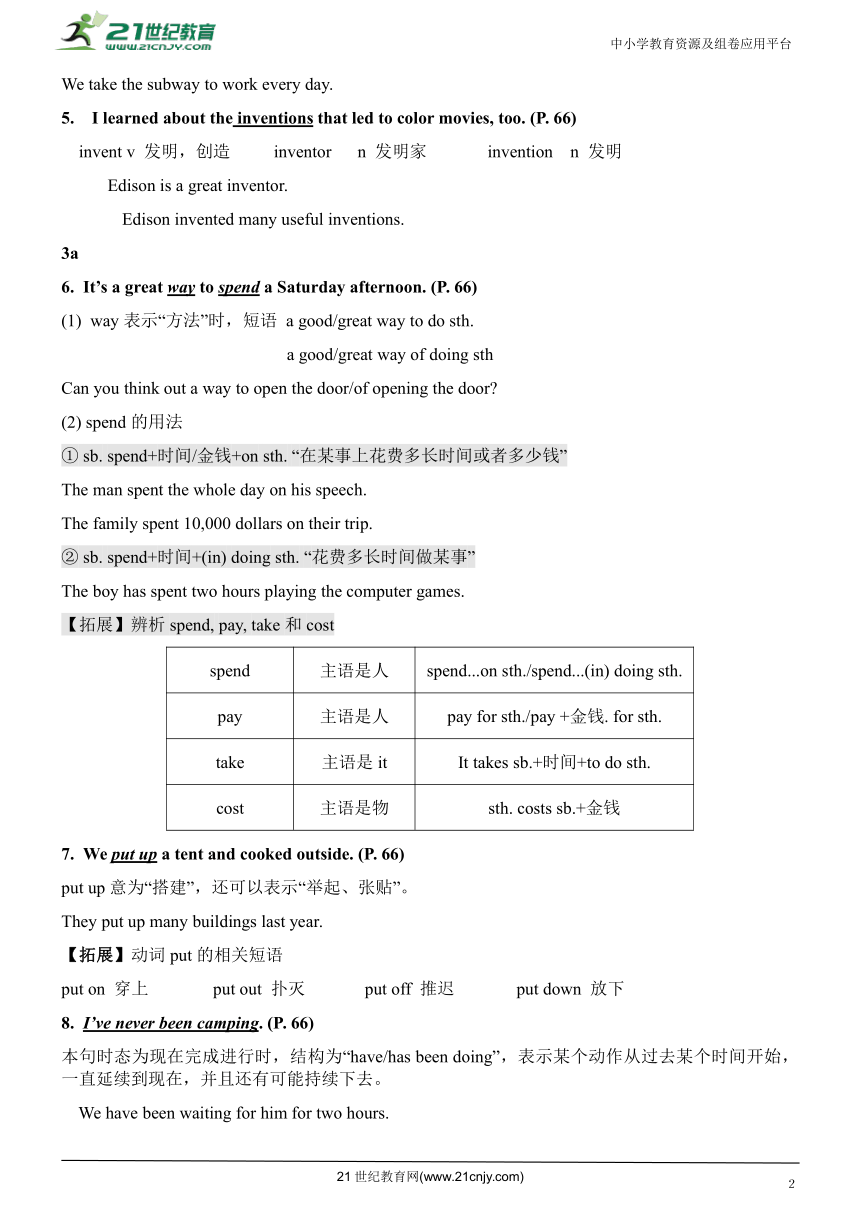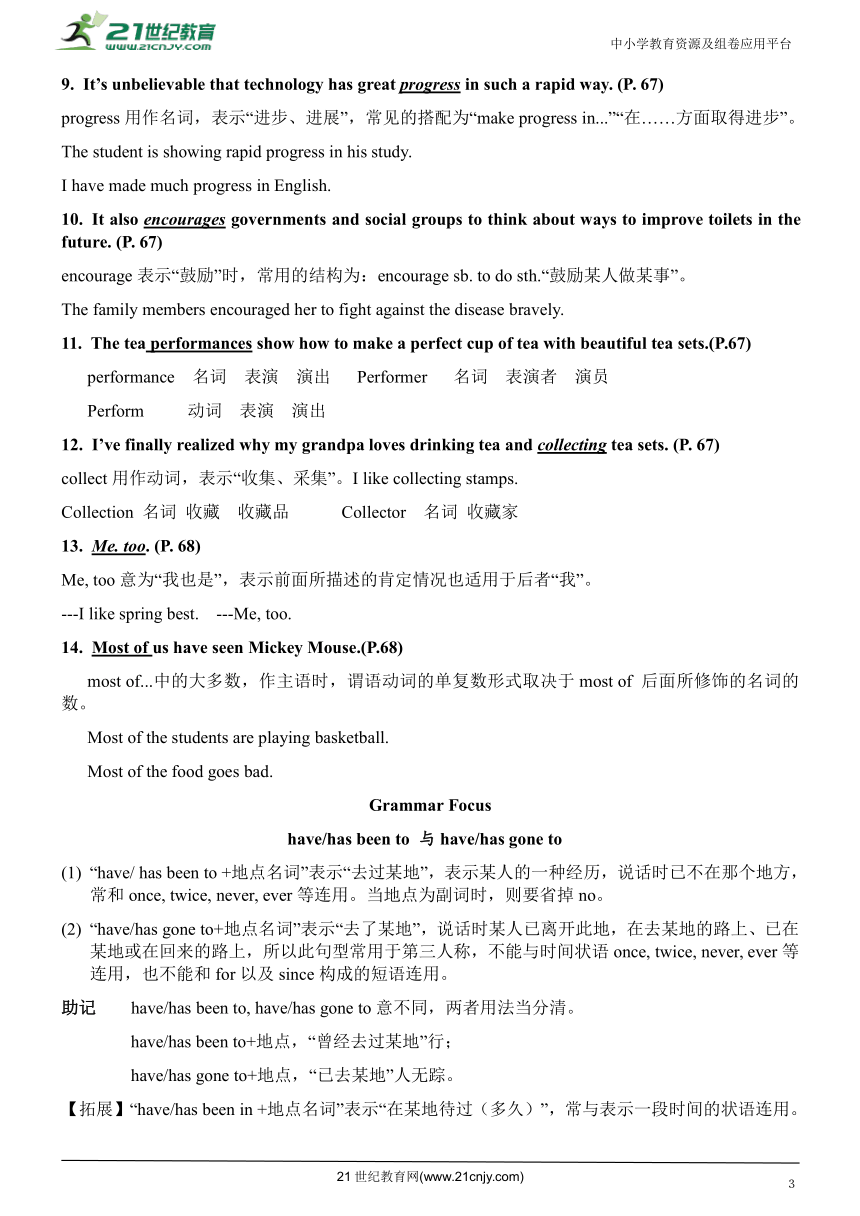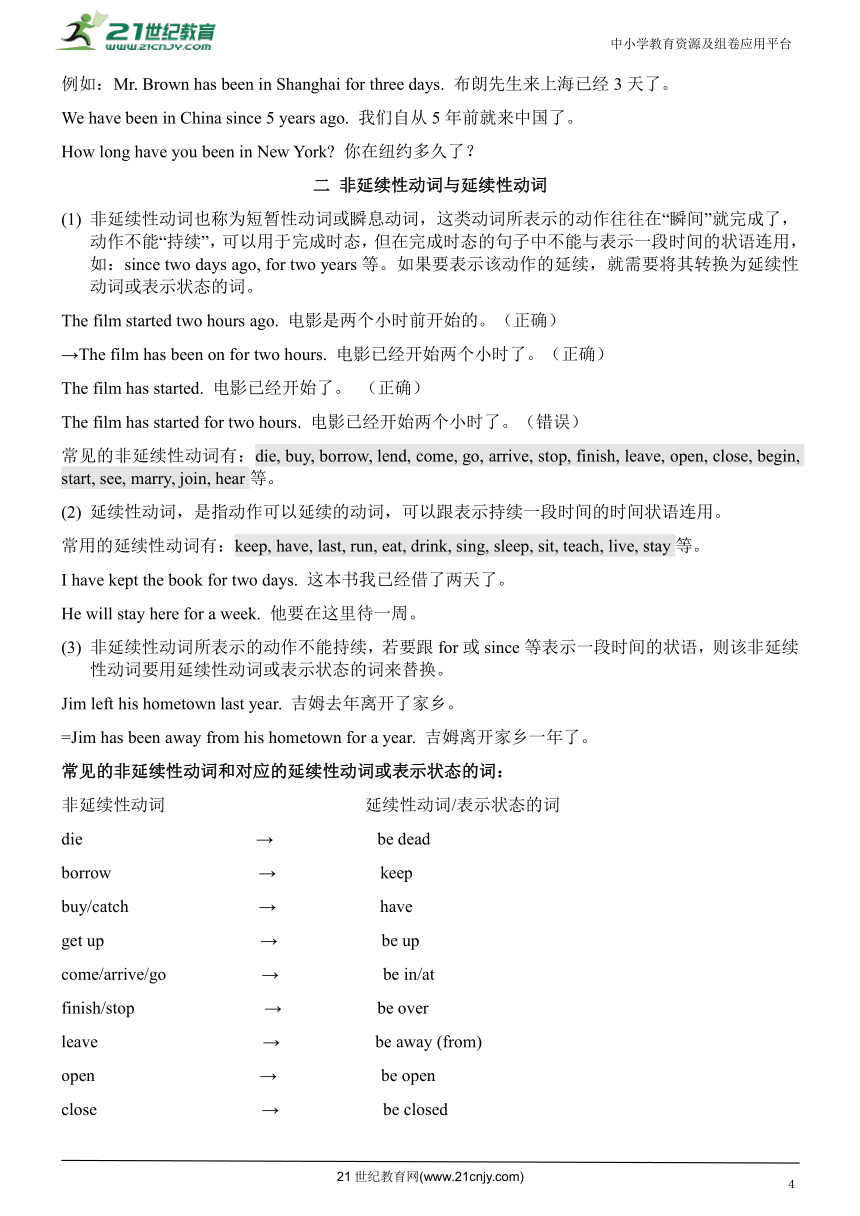Unit 9 Have you ever been to a museum知识点总结归纳【人教版八年级下册英语】
文档属性
| 名称 | Unit 9 Have you ever been to a museum知识点总结归纳【人教版八年级下册英语】 |  | |
| 格式 | docx | ||
| 文件大小 | 66.3KB | ||
| 资源类型 | 试卷 | ||
| 版本资源 | 人教新目标(Go for it)版 | ||
| 科目 | 英语 | ||
| 更新时间 | 2024-05-27 15:00:43 | ||
图片预览




文档简介
中小学教育资源及组卷应用平台
Unit 9 Have you ever been to a museum
Section A
Me neither (P. 65)
me neither意为“我也不……”,表示前者的否定情况也适用于我,反义词为me too。
---Susan can’t play the piano at all.
---Me neither.
【解析】在英语中,表示“也”的知识归纳如下:
主语 + neither
A. 否定句中的“也” neither +助动词/be + 主语
完整的否定句后加either,但要加逗号隔开。
— He didn’t go to school. 他没有去上学。
—Me neither.
= =I didn’t go to school , either.
主语 + too
肯定句中的“也” so +助动词/be+ 主语
完整的肯定句后加too,且要用逗号隔开。
— He is a good student.
— Me too.= =I’m a good student, too.
Eg: — Peter has never been to a water park. — _____.
I haven’t neither B. I haven’t too C. Me too D. Me neither
Let’s go to one tomorrow. (P. 65)
one是不定代词,用来代替前面出现过的可数名词单数,如果指代名词复数,用ones。
Here are my books. Which one do you want to read
---I don’t like these dresses.
---How about those ones over there.
Let’s go somewhere different today. (P. 65)
somewhere用作副词,表示“在某处、到某处”,常用于肯定句中,在否定句和疑问句中用anywhere。
It’s cold here. Let’s go somewhere else.
Did you go anywhere last Sunday
They are going to take the subway. (P. 66)
take the subway意为“乘地铁”,take用作动词,可以表示“乘、坐(车、船等)”。
We take the subway to work every day.
I learned about the inventions that led to color movies, too. (P. 66)
invent v 发明,创造 inventor n 发明家 invention n 发明
Edison is a great inventor.
Edison invented many useful inventions.
3a
It’s a great way to spend a Saturday afternoon. (P. 66)
way表示“方法”时,短语 a good/great way to do sth.
a good/great way of doing sth
Can you think out a way to open the door/of opening the door
(2) spend的用法
① sb. spend+时间/金钱+on sth. “在某事上花费多长时间或者多少钱”
The man spent the whole day on his speech.
The family spent 10,000 dollars on their trip.
② sb. spend+时间+(in) doing sth. “花费多长时间做某事”
The boy has spent two hours playing the computer games.
【拓展】辨析spend, pay, take和cost
spend 主语是人 spend...on sth./spend...(in) doing sth.
pay 主语是人 pay for sth./pay +金钱. for sth.
take 主语是it It takes sb.+时间+to do sth.
cost 主语是物 sth. costs sb.+金钱
We put up a tent and cooked outside. (P. 66)
put up意为“搭建”,还可以表示“举起、张贴”。
They put up many buildings last year.
【拓展】动词put的相关短语
put on 穿上 put out 扑灭 put off 推迟 put down 放下
I’ve never been camping. (P. 66)
本句时态为现在完成进行时,结构为“have/has been doing”,表示某个动作从过去某个时间开始,一直延续到现在,并且还有可能持续下去。
We have been waiting for him for two hours.
It’s unbelievable that technology has great progress in such a rapid way. (P. 67)
progress用作名词,表示“进步、进展”,常见的搭配为“make progress in...”“在……方面取得进步”。
The student is showing rapid progress in his study.
I have made much progress in English.
It also encourages governments and social groups to think about ways to improve toilets in the future. (P. 67)
encourage表示“鼓励”时,常用的结构为:encourage sb. to do sth.“鼓励某人做某事”。
The family members encouraged her to fight against the disease bravely.
The tea performances show how to make a perfect cup of tea with beautiful tea sets.(P.67)
performance 名词 表演 演出 Performer 名词 表演者 演员
Perform 动词 表演 演出
I’ve finally realized why my grandpa loves drinking tea and collecting tea sets. (P. 67)
collect用作动词,表示“收集、采集”。I like collecting stamps.
Collection 名词 收藏 收藏品 Collector 名词 收藏家
Me. too. (P. 68)
Me, too意为“我也是”,表示前面所描述的肯定情况也适用于后者“我”。
---I like spring best. ---Me, too.
Most of us have seen Mickey Mouse.(P.68)
most of...中的大多数,作主语时,谓语动词的单复数形式取决于most of 后面所修饰的名词的数。
Most of the students are playing basketball.
Most of the food goes bad.
Grammar Focus
have/has been to 与have/has gone to
“have/ has been to +地点名词”表示“去过某地”,表示某人的一种经历,说话时已不在那个地方,常和once, twice, never, ever等连用。当地点为副词时,则要省掉no。
“have/has gone to+地点名词”表示“去了某地”,说话时某人已离开此地,在去某地的路上、已在某地或在回来的路上,所以此句型常用于第三人称,不能与时间状语once, twice, never, ever等连用,也不能和for以及since构成的短语连用。
助记 have/has been to, have/has gone to意不同,两者用法当分清。
have/has been to+地点,“曾经去过某地”行;
have/has gone to+地点,“已去某地”人无踪。
【拓展】“have/has been in +地点名词”表示“在某地待过(多久)”,常与表示一段时间的状语连用。
例如:Mr. Brown has been in Shanghai for three days. 布朗先生来上海已经3天了。
We have been in China since 5 years ago. 我们自从5年前就来中国了。
How long have you been in New York 你在纽约多久了?
二 非延续性动词与延续性动词
非延续性动词也称为短暂性动词或瞬息动词,这类动词所表示的动作往往在“瞬间”就完成了,动作不能“持续”,可以用于完成时态,但在完成时态的句子中不能与表示一段时间的状语连用,如:since two days ago, for two years等。如果要表示该动作的延续,就需要将其转换为延续性动词或表示状态的词。
The film started two hours ago. 电影是两个小时前开始的。(正确)
→The film has been on for two hours. 电影已经开始两个小时了。(正确)
The film has started. 电影已经开始了。 (正确)
The film has started for two hours. 电影已经开始两个小时了。(错误)
常见的非延续性动词有:die, buy, borrow, lend, come, go, arrive, stop, finish, leave, open, close, begin, start, see, marry, join, hear等。
延续性动词,是指动作可以延续的动词,可以跟表示持续一段时间的时间状语连用。
常用的延续性动词有:keep, have, last, run, eat, drink, sing, sleep, sit, teach, live, stay等。
I have kept the book for two days. 这本书我已经借了两天了。
He will stay here for a week. 他要在这里待一周。
非延续性动词所表示的动作不能持续,若要跟for或since等表示一段时间的状语,则该非延续性动词要用延续性动词或表示状态的词来替换。
Jim left his hometown last year. 吉姆去年离开了家乡。
=Jim has been away from his hometown for a year. 吉姆离开家乡一年了。
常见的非延续性动词和对应的延续性动词或表示状态的词:
非延续性动词 延续性动词/表示状态的词
die → be dead
borrow → keep
buy/catch → have
get up → be up
come/arrive/go → be in/at
finish/stop → be over
leave → be away (from)
open → be open
close → be closed
begin/start → be on
marry → be married
join → be in/ be a member of
非延续性动词的现在完成时的否定式可以和表示一段时间的时间状语连用,因为非延续性动词的这种否定形式构成一种状态,而这一状态是可以持续的。
例如:He hasn’t bought any sweets for a year. 他已经有一年没有买糖果了。
I haven’t seen Mr. Zhang for ages. 我好几年没有看到张先生了。
Section B
For thousands of tourists from China, this small island in Southeast Asia is a wonderful and safe place to take a holiday. (P. 70)
thousands of意为“成千上万的、数以万计的”,表示一个不具体的数字,前面不能用具体的数字修饰,后接可数名词复数形式。They plant thousands of trees every year.
On the one hand, more than three quarters of the population are Chinese...On the other hand, Singapore is an English-speaking country...(P. 70)
on the one hand...on the other hand...意为“一方面……,另一方面……”,用于引出不同的或者对立的观点和看法。
On the one hand, Peter wants to make more money. On the other hand, he wants to have more time to enjoy life.
three quarters of the population are Chinese...
three quarters 四分之三(分数表达法)
【分数词的表达法】:
1).结构: a).分子用基数词,分母用序数词.
分子(基数词) 1
分母(序数词) 4 = one fourth = one quarter
b).当分子大于1时,分母为序数词加s.
= three fourths = three quarters
2).注意: 分数词的几种特殊形式.
1/3—one third = a third
1/4—one fourth = a quarter
1/2—one second = a half
3/4—three fourths = three quarters
3).分数词作主语时, 谓语动词根据分数词后面的名词来确定.
不可数名词 +动词单三形式
分数 + of +
可数名词 + 动词变复数形式
Two fifths of the milk ______(be ) drunk by Tom .
One third of the students _______(be )girls .
( ) The number of the students in our grade ___ about ___ of them are girls.
A. are, six hundreds ; two thirds B. is ; six hundred; two third
C. is ; six hundred; two thirds D. are; six hundred; two third
Eg: It’s said that ______ of the water around the world ______ polluted.
two third; has B. two thirds; have
C. two third; are D. two thirds; is
当分数做主语时,谓语动词的单复数要与其后面的名词的数保持一致
One fifth of the water is dirty.
Three fifths of the students in our class are girls.
Maybe you fear that you won’t be able to find anything good to eat when you travel. (P. 70)
fear用作动词,意为“害怕、惧怕”。
She feared to tell him the truth.
Whether you like Indian food, Western food or Japanese food, you’ll find it all in Singapore! (P. 70)
whether用作连词,表示“不管……(还是);或者…(或者)”,常与or连用,引导让步状语从句。
Whether you like it or not, you’ll have to do it.
However, if you go to see lions, tigers or foxes during the daytime, they’ll probably be asleep. (P. 70)
however用作副词,表示“然而、不过”,表示转折,后常接逗号。
It rained suddenly. However, it became clear soon.
One great thing about Singapore is that the temperature is almost the same all year around. (P. 70)
all year around表示“全年”,也可以说all the year around。
Some trees are green all year around.
This is because the island is so close to the equator. (P. 70)
be close to表示“靠近、接近、离……近”,close此处用作形容词,表示“接近的”。
The window is close to the door.
My house is close to a supermarket.
So you can choose to go whenever you like-spring, summer, autumn or winter. (P. 70)
whenever用作连词,表示“在任何时候、无论何时”,whenever=no matter when
在句中引导时间状语从句。
You can come back whenever you want to.
whatever=no matter what 无论什么
wherever=no matter where 无论哪里
however=no matter how 不管怎样
作文
写作要求:写一篇80字的文章描述你的家乡或者你去过的地方。
句型:
Have you ever tried/seen/been… If you…, you will/can…
You should… One great thing about …is…
以描述海南岛为例:
Have you ever been to Hainan Island It is the second largest island in China. It’s a beautiful place. If you go there, you should walk along the beaches. The weather in Hainan is very hot, so people like doing many water sports, such as scuba diving (潜水), fishing, swimming, surfing and boating. One great thing about Hainan is that you can try many kinds of sweet fruit in Hainan. If you go to Hainan, I’m sure you will enjoy yourself.
假如你到过济南旅游过几次,那里的植物园(Botanical Garden),趵突泉(Baotu Spring) 大明湖(Daming lake),动物园,以及交通,购物等给你留下了深刻印象。80—100 词左右。 请用英语写一篇来分享一下你的游历。
提示词:have been to, fall in love with , have fun , such as , would like to, guide
Have you ever been to Jinan I have been there several times. I think it’s really a beautiful city. I fell in love with it when I first travelled there.
There are some beautiful places to have fun , such as Baotanical Garden, Baotu Spring and Daming Lake. In the zoo, you can see many kinds of animals walking around and some are sleeping. You can easily buy what you want. Because there are lovely restaurants and fantastic gift shops everywhere. Buses and taxis can take you where you want to go.
Welcome to Jinan. I would like to be your tour guide.
21世纪教育网(www.21cnjy.com)
Unit 9 Have you ever been to a museum
Section A
Me neither (P. 65)
me neither意为“我也不……”,表示前者的否定情况也适用于我,反义词为me too。
---Susan can’t play the piano at all.
---Me neither.
【解析】在英语中,表示“也”的知识归纳如下:
主语 + neither
A. 否定句中的“也” neither +助动词/be + 主语
完整的否定句后加either,但要加逗号隔开。
— He didn’t go to school. 他没有去上学。
—Me neither.
= =I didn’t go to school , either.
主语 + too
肯定句中的“也” so +助动词/be+ 主语
完整的肯定句后加too,且要用逗号隔开。
— He is a good student.
— Me too.= =I’m a good student, too.
Eg: — Peter has never been to a water park. — _____.
I haven’t neither B. I haven’t too C. Me too D. Me neither
Let’s go to one tomorrow. (P. 65)
one是不定代词,用来代替前面出现过的可数名词单数,如果指代名词复数,用ones。
Here are my books. Which one do you want to read
---I don’t like these dresses.
---How about those ones over there.
Let’s go somewhere different today. (P. 65)
somewhere用作副词,表示“在某处、到某处”,常用于肯定句中,在否定句和疑问句中用anywhere。
It’s cold here. Let’s go somewhere else.
Did you go anywhere last Sunday
They are going to take the subway. (P. 66)
take the subway意为“乘地铁”,take用作动词,可以表示“乘、坐(车、船等)”。
We take the subway to work every day.
I learned about the inventions that led to color movies, too. (P. 66)
invent v 发明,创造 inventor n 发明家 invention n 发明
Edison is a great inventor.
Edison invented many useful inventions.
3a
It’s a great way to spend a Saturday afternoon. (P. 66)
way表示“方法”时,短语 a good/great way to do sth.
a good/great way of doing sth
Can you think out a way to open the door/of opening the door
(2) spend的用法
① sb. spend+时间/金钱+on sth. “在某事上花费多长时间或者多少钱”
The man spent the whole day on his speech.
The family spent 10,000 dollars on their trip.
② sb. spend+时间+(in) doing sth. “花费多长时间做某事”
The boy has spent two hours playing the computer games.
【拓展】辨析spend, pay, take和cost
spend 主语是人 spend...on sth./spend...(in) doing sth.
pay 主语是人 pay for sth./pay +金钱. for sth.
take 主语是it It takes sb.+时间+to do sth.
cost 主语是物 sth. costs sb.+金钱
We put up a tent and cooked outside. (P. 66)
put up意为“搭建”,还可以表示“举起、张贴”。
They put up many buildings last year.
【拓展】动词put的相关短语
put on 穿上 put out 扑灭 put off 推迟 put down 放下
I’ve never been camping. (P. 66)
本句时态为现在完成进行时,结构为“have/has been doing”,表示某个动作从过去某个时间开始,一直延续到现在,并且还有可能持续下去。
We have been waiting for him for two hours.
It’s unbelievable that technology has great progress in such a rapid way. (P. 67)
progress用作名词,表示“进步、进展”,常见的搭配为“make progress in...”“在……方面取得进步”。
The student is showing rapid progress in his study.
I have made much progress in English.
It also encourages governments and social groups to think about ways to improve toilets in the future. (P. 67)
encourage表示“鼓励”时,常用的结构为:encourage sb. to do sth.“鼓励某人做某事”。
The family members encouraged her to fight against the disease bravely.
The tea performances show how to make a perfect cup of tea with beautiful tea sets.(P.67)
performance 名词 表演 演出 Performer 名词 表演者 演员
Perform 动词 表演 演出
I’ve finally realized why my grandpa loves drinking tea and collecting tea sets. (P. 67)
collect用作动词,表示“收集、采集”。I like collecting stamps.
Collection 名词 收藏 收藏品 Collector 名词 收藏家
Me. too. (P. 68)
Me, too意为“我也是”,表示前面所描述的肯定情况也适用于后者“我”。
---I like spring best. ---Me, too.
Most of us have seen Mickey Mouse.(P.68)
most of...中的大多数,作主语时,谓语动词的单复数形式取决于most of 后面所修饰的名词的数。
Most of the students are playing basketball.
Most of the food goes bad.
Grammar Focus
have/has been to 与have/has gone to
“have/ has been to +地点名词”表示“去过某地”,表示某人的一种经历,说话时已不在那个地方,常和once, twice, never, ever等连用。当地点为副词时,则要省掉no。
“have/has gone to+地点名词”表示“去了某地”,说话时某人已离开此地,在去某地的路上、已在某地或在回来的路上,所以此句型常用于第三人称,不能与时间状语once, twice, never, ever等连用,也不能和for以及since构成的短语连用。
助记 have/has been to, have/has gone to意不同,两者用法当分清。
have/has been to+地点,“曾经去过某地”行;
have/has gone to+地点,“已去某地”人无踪。
【拓展】“have/has been in +地点名词”表示“在某地待过(多久)”,常与表示一段时间的状语连用。
例如:Mr. Brown has been in Shanghai for three days. 布朗先生来上海已经3天了。
We have been in China since 5 years ago. 我们自从5年前就来中国了。
How long have you been in New York 你在纽约多久了?
二 非延续性动词与延续性动词
非延续性动词也称为短暂性动词或瞬息动词,这类动词所表示的动作往往在“瞬间”就完成了,动作不能“持续”,可以用于完成时态,但在完成时态的句子中不能与表示一段时间的状语连用,如:since two days ago, for two years等。如果要表示该动作的延续,就需要将其转换为延续性动词或表示状态的词。
The film started two hours ago. 电影是两个小时前开始的。(正确)
→The film has been on for two hours. 电影已经开始两个小时了。(正确)
The film has started. 电影已经开始了。 (正确)
The film has started for two hours. 电影已经开始两个小时了。(错误)
常见的非延续性动词有:die, buy, borrow, lend, come, go, arrive, stop, finish, leave, open, close, begin, start, see, marry, join, hear等。
延续性动词,是指动作可以延续的动词,可以跟表示持续一段时间的时间状语连用。
常用的延续性动词有:keep, have, last, run, eat, drink, sing, sleep, sit, teach, live, stay等。
I have kept the book for two days. 这本书我已经借了两天了。
He will stay here for a week. 他要在这里待一周。
非延续性动词所表示的动作不能持续,若要跟for或since等表示一段时间的状语,则该非延续性动词要用延续性动词或表示状态的词来替换。
Jim left his hometown last year. 吉姆去年离开了家乡。
=Jim has been away from his hometown for a year. 吉姆离开家乡一年了。
常见的非延续性动词和对应的延续性动词或表示状态的词:
非延续性动词 延续性动词/表示状态的词
die → be dead
borrow → keep
buy/catch → have
get up → be up
come/arrive/go → be in/at
finish/stop → be over
leave → be away (from)
open → be open
close → be closed
begin/start → be on
marry → be married
join → be in/ be a member of
非延续性动词的现在完成时的否定式可以和表示一段时间的时间状语连用,因为非延续性动词的这种否定形式构成一种状态,而这一状态是可以持续的。
例如:He hasn’t bought any sweets for a year. 他已经有一年没有买糖果了。
I haven’t seen Mr. Zhang for ages. 我好几年没有看到张先生了。
Section B
For thousands of tourists from China, this small island in Southeast Asia is a wonderful and safe place to take a holiday. (P. 70)
thousands of意为“成千上万的、数以万计的”,表示一个不具体的数字,前面不能用具体的数字修饰,后接可数名词复数形式。They plant thousands of trees every year.
On the one hand, more than three quarters of the population are Chinese...On the other hand, Singapore is an English-speaking country...(P. 70)
on the one hand...on the other hand...意为“一方面……,另一方面……”,用于引出不同的或者对立的观点和看法。
On the one hand, Peter wants to make more money. On the other hand, he wants to have more time to enjoy life.
three quarters of the population are Chinese...
three quarters 四分之三(分数表达法)
【分数词的表达法】:
1).结构: a).分子用基数词,分母用序数词.
分子(基数词) 1
分母(序数词) 4 = one fourth = one quarter
b).当分子大于1时,分母为序数词加s.
= three fourths = three quarters
2).注意: 分数词的几种特殊形式.
1/3—one third = a third
1/4—one fourth = a quarter
1/2—one second = a half
3/4—three fourths = three quarters
3).分数词作主语时, 谓语动词根据分数词后面的名词来确定.
不可数名词 +动词单三形式
分数 + of +
可数名词 + 动词变复数形式
Two fifths of the milk ______(be ) drunk by Tom .
One third of the students _______(be )girls .
( ) The number of the students in our grade ___ about ___ of them are girls.
A. are, six hundreds ; two thirds B. is ; six hundred; two third
C. is ; six hundred; two thirds D. are; six hundred; two third
Eg: It’s said that ______ of the water around the world ______ polluted.
two third; has B. two thirds; have
C. two third; are D. two thirds; is
当分数做主语时,谓语动词的单复数要与其后面的名词的数保持一致
One fifth of the water is dirty.
Three fifths of the students in our class are girls.
Maybe you fear that you won’t be able to find anything good to eat when you travel. (P. 70)
fear用作动词,意为“害怕、惧怕”。
She feared to tell him the truth.
Whether you like Indian food, Western food or Japanese food, you’ll find it all in Singapore! (P. 70)
whether用作连词,表示“不管……(还是);或者…(或者)”,常与or连用,引导让步状语从句。
Whether you like it or not, you’ll have to do it.
However, if you go to see lions, tigers or foxes during the daytime, they’ll probably be asleep. (P. 70)
however用作副词,表示“然而、不过”,表示转折,后常接逗号。
It rained suddenly. However, it became clear soon.
One great thing about Singapore is that the temperature is almost the same all year around. (P. 70)
all year around表示“全年”,也可以说all the year around。
Some trees are green all year around.
This is because the island is so close to the equator. (P. 70)
be close to表示“靠近、接近、离……近”,close此处用作形容词,表示“接近的”。
The window is close to the door.
My house is close to a supermarket.
So you can choose to go whenever you like-spring, summer, autumn or winter. (P. 70)
whenever用作连词,表示“在任何时候、无论何时”,whenever=no matter when
在句中引导时间状语从句。
You can come back whenever you want to.
whatever=no matter what 无论什么
wherever=no matter where 无论哪里
however=no matter how 不管怎样
作文
写作要求:写一篇80字的文章描述你的家乡或者你去过的地方。
句型:
Have you ever tried/seen/been… If you…, you will/can…
You should… One great thing about …is…
以描述海南岛为例:
Have you ever been to Hainan Island It is the second largest island in China. It’s a beautiful place. If you go there, you should walk along the beaches. The weather in Hainan is very hot, so people like doing many water sports, such as scuba diving (潜水), fishing, swimming, surfing and boating. One great thing about Hainan is that you can try many kinds of sweet fruit in Hainan. If you go to Hainan, I’m sure you will enjoy yourself.
假如你到过济南旅游过几次,那里的植物园(Botanical Garden),趵突泉(Baotu Spring) 大明湖(Daming lake),动物园,以及交通,购物等给你留下了深刻印象。80—100 词左右。 请用英语写一篇来分享一下你的游历。
提示词:have been to, fall in love with , have fun , such as , would like to, guide
Have you ever been to Jinan I have been there several times. I think it’s really a beautiful city. I fell in love with it when I first travelled there.
There are some beautiful places to have fun , such as Baotanical Garden, Baotu Spring and Daming Lake. In the zoo, you can see many kinds of animals walking around and some are sleeping. You can easily buy what you want. Because there are lovely restaurants and fantastic gift shops everywhere. Buses and taxis can take you where you want to go.
Welcome to Jinan. I would like to be your tour guide.
21世纪教育网(www.21cnjy.com)
同课章节目录
- Unit 1 What's the matter?
- Section A
- Section B
- Unit 2 I'll help to clean up the city parks.
- Section A
- Section B
- Unit 3 Could you please clean your room?
- Section A
- Section B
- Unit 4 Why don't you talk to your parents?
- Section A
- Section B
- Unit 5 What were you doing when the rainstorm came
- Section A
- Section B
- Review of Units 1-5
- Unit 6 An old man tried to move the mountains.
- Section A
- Section B
- Unit 7 What's the highest mountain in the world?
- Section A
- Section B
- Unit 8 Have you read Treasure Island yet?
- Section A
- Section B
- Unit 9 Have you ever been to a museum?
- Section A
- Section B
- Unit 10 I've had this bike for three years.
- Section A
- Section B
